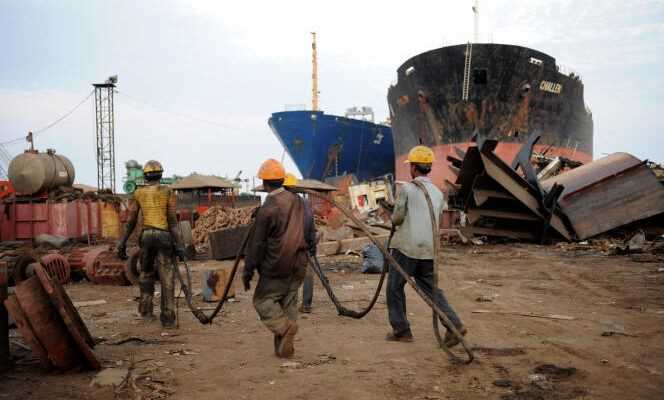Chronic. They are stranded, like large dead whales, on the beaches of Alang in India, Gadani (Pakistan) or Chittagong (Bangladesh). After having sometimes sailed under flags of convenience, liners, bulk carriers, tankers, container ships and even aircraft carriers have arrived from all over the world, often packed with materials, such as asbestos, dangerous for the environment and for the workers who use them. bone in inhumane conditions.
The Robin des Bois environmental association tracks their sometimes chaotic journey in its quarterly newsletter At the scrapyard. Struck by the crisis, cruise lines scrapped many liners in 2020. Container ship owners are fighting to keep afloat everything that has the right to float. There have never been so many ships in the world’s seas, and the resumption of demolition activity is not expected until 2023.
Everyone seems to benefit, according to Robin Hood. “In this year 2021 marked by the recovery“ whatever the cost ”of international trade, the more shipowners and brokers postpone scrapping, the more money they earn, notes the association in its latest bulletin, published Tuesday, November 23. The average purchase price by shipyards on the Indian subcontinent reached 600 dollars per tonne (530 euros), against 350 dollars in 2020 at the same time. “ And up to $ 850 for an oil tanker with stainless steel tanks.
The downstream part of the maritime sector is not its brightest link
The downstream side of the maritime industry is not its brightest link. Many shipowners resell their rafts to other players, who register them for their last trip under “hearse flags” (Palau, Sierra Leone, etc.) that do not pay much attention to the conditions of their demolition, then transfer the proceeds of this activity to a Fiscal paradise. It is in Asia, where the environmental and social standards enshrined in the Hong Kong Convention (2009) are far from always being respected, that 85% of ships are dismantled, and often on the beach, according to the technique of beaching.
The NGO Shipbreaking Platform estimates that 7,073 since 2009 the number of ships treated in the Indian subcontinent – and at 425 that of workers dead on their “yards”. The situation is improving on the Old Continent, which nevertheless weighs only 3% of the market. Since 2019, the recycling of vessels flying the European flag must be done in one of the forty sites approved by Brussels, some of which are in Turkey or Norway. But shipowners deplore that their capacities are very limited, and the price of steel torn from wrecks three to four times lower than in Asia. Alang and Chittagong have a bright future ahead of them.
